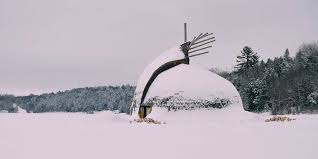


Filmmaker Darlene Naponse’ arresting documentary AKI – “earth, land, or ground in relation to the Anishnaabe homeland” – was filmed on her reservation near Sudbury, Ontario, Atikameksheng Anishnawbek, formerly White Fish Lake First Nation. AKI celebrates the unspoiled beauty of the area and threats against it. What She Said’ Anne Brodie spoke with Naponse, who is in Toronto to present Aki at #TIFF50.
Darlene, you’ve done it again. You’ve made a stunning, cinematically rich film. This time a documentary, with your special emphasis on cinematic beauty.
As a filmmaker, I loved large images projected on the screen. That’s when I fell in love with film. My intentions were always to have those images. You can see the beauty within the frame of the people and nature.
How old were you when that impression was made?
We used to go into town to the cinema. So, I was very young.
Once again you celebrate the natural world. I think most people are starved for it but don’t know it.
I agree. I hope people go out in nature, to even be able to find it and what it means to us. It can be surprising. Yesterday Ally (Darlene’s publicist) and I found a green spot in Toronto to sit. And I have a friend here. But its overwhelming. Bring me to the water!
Do you live in Toronto and up north?
I live in my reserve so our backyard is all nature. I come to Toronto for work and hang out, but I was born and raised in my community, I travelled, lived in Toronto for a bit, but at 26, I went home, basically to work for my community. It was a hard choice and I was not always connected. I enjoy the city but it’s not my space. It was a movement a choice, to make film from the north, that was a big part of it. And to work with community.
It great to see the children at play, in the doc, basketball, hockey, full of zest.
These kids are always at play.
Watching the film and its wonderful images of nature, I really felt my stress level go down. And some of these shots are astounding, And seemingly feet from two bears at a garbage dump.
We were very close to those bears. They do notice us; they’re there all the time. You just take out your garbage and there’s a bear. You try not to go alone.
Well, I’m glad they’re bumping up their food intake, getting enough to eat.
But it also shows our own garbage. We create and use single use products so much, so looking at our own garbage as well and how nature is even in there.
There’s also a stunning sequence shooting up from under the ice on the lake to capture trees on the shoreline.
I do a lot of that, shooting underwater and being immersed under water. It’s interesting, I was up north talking to a community member and a community member about how the ice heals. It covers the water and heals what’s underneath. That always stuck with me. I wanted to show those moments and feel that. I like finding different ways of being in nature. Just being in the moment.
I like the film’s gentle nature. It brings stress levels way down and swells the heart. But you did show threats to this world. A no trespassing sign from INKO, bad water pumped into the lakes from industry, clearcutting. That’s so important.
That was intentional. During shooting I felt like I was writing a book about how I wanted to make this film. We walked into every block where we shot, a small crew, and find the beauty even in all the things that anchor us, not to excuse what’s been happening there for hundred years. The changes mining has made but I also want to exist in the fact of seeing it and how we live within in it every day. When we take ourselves out of it, we see it in a different way. The green water, round water storage building, how much water is used in mining. And how the lakes are affected by that. We see something differently and its about finding those things.
How do you start your first days of shooting?
When it rains! Crew members say “Oh, a Darlene Naponse film? Wonder if it’ll be a snowstorm, or the first rainstorm this time!”.
What’s next?
I was writing AKI 2 but stopped and began a feature about perspective and the Missing and Murdered Women and Girls issue. We hope to do a co-pro with Italy, and I’m really excited. That’s our next venture!
This resource guide addresses sexual, racial and lateral violence – and combinations thereof – which may impact some readers. Please feel free to call the national support line at 1–844-413‑6649 (available 24 hours a day, 7 days a week). Its estimated that Indigenous women are six times more like to be murdered in Canada and the US.